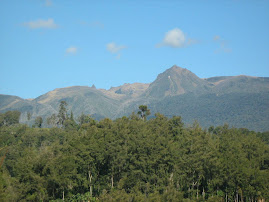China does not see itself as a "superpower"
By Mathew Yakai in Changchun, China
NEXT to Youyi Huigun hotel stands two ongoing construction buildings.
Youyi Huigun (Chinese), is ‘friendship hotel’ in English. My room is on the tenth floor of this five star hotel.
The foundation work was done late last year but suspended due to heavy snow.
The construction started again early last month. Every morning I wake up from my bed in the midst of the construction noise.
The construction is still going on when I am typing this article in my room at 9:28pm, Wednesday 2, for you to read today.
The construction work is done on 24 hours rotational bases. I was told that there are two shifts, one from nine in the noon to nine in the morning and the day shift takes over for the next 12 hours.
Beginning last month, I saw the construction was on the third floor. Within a span of about five weeks, the construction is up to the 12th floor. I was told that it is a 24 floor building and will be completed late next month.
This is very fast, compared to the kind of construction pace in this country.
Wang Li, a 24 years old Business Management student at Jilin University in China told me that Changchun was once known for its rice paddies and farming. That was about five years ago. Today, most of the rice paddies have been removed and land is used for building sky scrapers and factories.
The two new constructions next to my hotel room are good examples of many new buildings in Changchun.
When I take bicycle ride with Li in Changchun city, I see many old buildings being demolished and new ones have been erected. The same is happening throughout China today.
China successfully launched Chang’e 1 lunar orbiter to space late last year and images sent back to the ground station for research purposes are successful.
Now, China is planning to launch Shenzhou VII manned space craft and scientists are confident that the preparation is well underway.
The Olympic flame has arrived in China last week from Greek and has sent forth ripples of Olympic spirit throughout China and the region. The torch will visit many countries including more then 100 cities in China alone.
Given all these success, many Chinese are seeing the year as one with national achievements they can be proud of.
Still, despite booming economic growth and influence over the past three decades, many Chinese do not consider their country a world “superpower”, a recent survey has shown.
According to China Daily English newspaper, the survey by social research company Horizon Research, polled more than 3,000 residents in 10 cities including Beijing, Shanghai and Guanzhou.
Close to 60 percent of those polled though the country should strengthen collaboration with international organizations or other countries in a wide range of global issues – as a supporter or coordinator rather than a leader.
About six in 10 said they did not consider the country as a superior, while about 22 percent said the country will never become one.
Another 20 percent said the country’s journey to becoming a superpower would take more than two decades.
“It’s a very normal attitude among Chinese citizens, to actively participate in international affairs, but not necessarily to do so as the leader,” said Wang Yizhou, deputy director of the Institute of World Economics and Politics under the Chinese Academy of Social Science (CASS)
“The Chinese people wish for their government to work with other countries to achieve global objectives, but they do not want to become the flag-raisers.”
Wang said such a mentality is a legacy of former state leader Deng Xiaoping, whose foreign policy put forward three decades ago when the country started on its opening – and reform, has been carried on by his successors.
Following Deng’s ideology, China’s foreign policy today encourages multilateralism as opposed to unilateralism.
According to Deng’s theory, when it comes to foreign policies, China is to participate, not to lead, not to have enemies,” Wang said.
The approach has had profound influence on many Chinese politicians. Think tanks and the public,” Wang added.
However, Wang said what has changed in the level and scale of fields that the country has participated in on the global stage, given its development into an economic power from one of the world’s poorest countries.
“China’s overseas presence and interests are gradually expanding as well,” Wang said.
He said overseas Chinese students, for instance, account for one-seventh of the world’s total number of overseas students, while the number of outbound tourists keeps rising.
“China has become more visible on the global stage,” Wang said.
Global concerns such as climate change and the nuclear issue on the Korean Peninsula have shown that the view of Beijing and its willingness to act on them have become prerequisites to any solution, Wang said.
This trend has in turn raised the global vision and awareness of the Chinese, the expert said.
“This is a time when China is expected to play a larger role…in many global issues,” Wang said.
At the same time, experts said the survey has shown that more should be involved in assessing the power and influence of a country.
Yan Xuetong, head of the Institute of International Studies at Tsinghua University said an accurate assessment of a country’s power depends on its cultural and intellectual prowess.
While there are no doubt that the country has risen to become an economic power in the past two decades, its military force has been weakened in that time and its political clout, if analyzed from its global influence, has come to a standstill, Yan said.
As a permanent member of the United Nations Security Council, China should help maintain world peace, strengthen its democracy and seek prosperity for its own people, said Wang Yusheng, a Beijing based researcher of international relations.
“Labeling China as a superpower is not inline with the country’s goals,” he said.
Scholar Gilbert Rozman said United States recognized China’s great power status even before the communist rose to power.
Rozman said during the war against Japan, Franklin Roosevelt sought to elevate China to the ranks of his “four policemen”, and at war’s end recognized Nationalists China as one of the five permanent members of the United Nations Security Council.
In the Korean War, Washington took Beijing seriously even if it was more interested in isolating it than in dealing with it in international organizations.
But it was only when former US President Richard Nixon and former Secretary of State Henry Kissinger arrived in China in 1972, playing up China’s standing as one of the world’s-five great powers that the situation changed decisively.
China has joined number of international organizations since former leader Deng’s opening to the outside world three decades ago.
By 1994, the representation numbers were 55 international governmental organization and 955 international nongovernmental organizations.
In institutions such as the Asian Development Bank, International Monetary Funds (IMF) and World Bank, China has been a model citizen.
Beijing as also acted responsibly in Asia’s economic crises contributing US$ 1 billion to the IMF stabilization package for Thailand.
China has all the potential of being the leader in many regional and international issues of common interest.
However, international relations expert Wang Yusheng says, “labeling China as a superpower is not in line with the country’s goal.”
Wang is among the many scholars and individuals who believe that “Chinese dragon should not replace the Russian bear.”
But only time will tell, and that is probably after the Summer Olympic Game in Beijing in August this year.
Note: Asia-Pacific Perspective: China + looks at Chinese society, culture, economy, governance and China’s role within the Asia Pacific region and the world over. It mainly focuses on how PNG can learn from China’s experience. The writer is a PNG student in China. This article was published by Island Sun in Solomon Islands and Sunday Chronicle in Papua New Guinea
American movie include Fijians as cast and crew
7 years ago









No comments:
Post a Comment